-
AROUSED BY GYMNOPEDIES (Isao Yukisada 2016)
ISAO YUKISADA: AROUSED BY GYMNOPEDIES (2016)

ITSUJI ITAO (RIGHT) IN AROUSED BY GYMNOPEDIES
So much sex, so little point
Indie filmmaker Isao Yukisada here films a homage to Japan's 1970's and '80's roman pornos, a series of softcore wedding romance with graphic sex. Well, not all that graphic, only every ten minutes a pretty young woman gets her bra and panties ripped off and gets screwed. Its one of five in a new series commissioned by Nikkatsu for their 45th anniversary "Roman Porno Reboot Project." But this is also a portrait of a disappointed cinematic poseur who's on the way down.
The protagonist is a failed art filmmaker, Shinji Furuya, played by the sad sack Itsuji Itao of Air Doll. He slouches through his role convincingly, somehow, as a randy loser with a burnt-out, wrinkled face who has a lean smooth body so we're not disgusted to see him mount his married wardrobe assistant; Yuka, a rich student; and, ironically, Arri, the actress who's just quit his current film and caused it to be cancelled. It was a sleazy skin flick anyway, what he's come down to, to make some quick money to pay hospital bills for his current wife, who's in a coma in an expensive hospital. He gets his first wife to prostitute herself to raise money for the cause, then at the hospital screws the nurse - not for the first time. This time it's in front of his comatose wife. It gets a rise out of her. Earlier, there's a retrospective of Shinji's films where only a handful of people show up, his students, one a male student who assaults him for having sex with his girlfriend. A fight breaks out, and Shinji runs off, with others in hot pursuit. So, sex and comedy.
Yusisada has a delicate, restrained style, matched by quiet, restrained sets that are easy on the eye. The film never feels crude: it's just that there's a sex scene every ten minutes or so, like in a porn movie with a lot of narrative. Only it's just fucking, without ceremony or frontal nudity. I was reminded of Jacques Nolot, whose own films have combined sleazy sex with serious cinematic content; there must be some good films that combine gloom, failure, and sleaze. One doesn't hate Shinji. And one can't feel very sorry for him. He's certainly a jaded loser; but he's catnip for pretty young women.
Another classy note is set to counteract the sleaze by the recurrent theme of Eric Satie's elegant, minimal piano piece, "Trois Gymnopédies," which is woven in by having a female admirer play it on Shinji's piano at the end - after which he runs off again, futilely, and perhaps fatally. Yukisada has certainly done his job for Nikkatsu - and yet, like the laziness of Shinji, it seems only just enough. And Shinji isn't really "aroused" by "Gymnopedies" - that's a cheat.
Aroused by Gymnopediesジムノペディに乱れる (Jimunopedi Ni Midareru),83 mins., debuted in Japan 26 Nov. 2016. Reviewed as part of the NYAFF - showing 14 July 2017.
Last edited by Chris Knipp; 07-09-2017 at 05:57 PM.
-
TRACES OF SIN (Kei Ishikawa 2016)
KEI ISHIKAWA: TRACES OF SIN (2016)
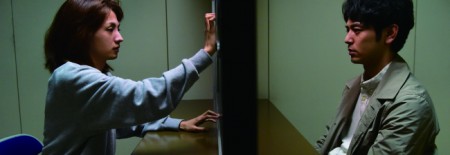
HIKARI MITSUMISHA AND SATOSHI TUMABUKI IN TRACES OF SIN
Poison friends
The first feature by Kei Ishikawa is from a screenplay adapted by Kôsuke Mukai from a novel by Tôkuro Nukui that explores the background of a cold case murder of a seemingly privileged young family. Tanaka (Satoshi Tsumabuki) is a journalist for a publication called Terrace Weekly who conducts interviews into the case for articles he hopes the Terrace will publish on the one-year anniversary of the (unsolved) case, the bloody murder of an upper class couple and their child. The interviews lead to flashbacks drawn from the series of depositions presented in Nukui's novel. These depict the world of Insiders the family belonged to and their ways of toying with and exploiting people they consider their inferiors, a generally ugly picture of some of Japan's social elite. Meanwhile we know from the first that Tanaka's sister Mitsuko (Hikari Mitsushima) is in jail for endangerment of a child, and eventually he begins telling a psychiatrist (Mitsuru Hirata), involved with his sister's case the ugly story of Mitsuko's abuse by their father when she was young. Eventually links between the two stories, of the Takou family Insiders and of Mitsuko, will emerge.
The murdered husband Takou (Keisuke Koide), as one of a Japanese elite, was thought to have led a kind of charmed life. Tanaka's explorations reveal a nasty manipulator and betrayer and his world's way of using, but always in the end excluding, any of the less privileged at school or university who seek to enter their privileged confines.
The main interest here is on class and in social networks (but not the internet kind), and This could just as well have been cast as a tale of love betrayal and ambition. But the murder mystery is an ever-popular glue to hold together all tales, and this does end with revelations - and additional shocks. Nonetheless it made me think at first of Emmanuel Bourdieu's Poison Friends, an intriguing French film I saw in the 2006 NYFF. That is, arguably, a better story, because it's not a cold case but a hot one - only a series of events that, after the fact, reveal to have involved a deceiving central figure; and the elite was one not of fixed class but of competitive young Paris intellectuals.
Director Ishikawa has commented that because he grew up in the country, the stratification and elitism he encountered when he came to Tokyo seemed strange to him. And so here he seeks to examine it. He had also encountered a different world by studying filmmaking in Lodz, Poland - and his cinematographer here, Piotr Niemyjski, who is Polish, may also look on things with a different eye. Can one detect hints of Krzysztof Kieślowski? Ishikawa had thought of doing comedies: he hasn't done one here. In fact this film is humorless and dry, with an edge of cruel tragedy. But it has an intensity that holds the attention. The string music composed by Takashi Ohmama, has a nice resonance.
Traces of Sin 愚行録 (Gukôroku, "Record of Folly "), 120 mins., debuted at Venice Sept. 2016, produced by Office Kitano; also Warsaw, Gothenberg, Nippon Collection Festival Germany, Hong Kong; theatrical release in Japan Feb. 2017, Taiwan June 2017. Reviewed as part of NYAFF 2017, where it's showing Mon., July 10, 6 pm, at the Walter Reade Theater.
Last edited by Chris Knipp; 07-10-2017 at 08:08 PM.
-
MAD WORLD (Wong CHun 2016)
WONG CHUN: MAD WORLD (2016)
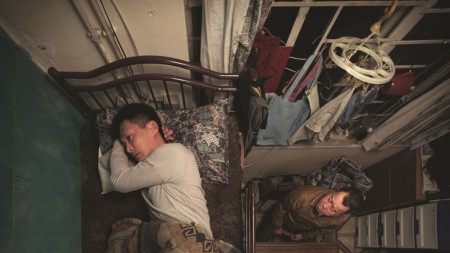
SHAWN YUE AND ERIC TSANG CHI-WAI IN MAD WORLD
Seeking to regain mental balance in a cramped Hong Kong tenement
Wong Chun's much praised low budget ($258K) Hong Kong feature directorial debut with screenplay by Florence Chan Chor-hang focuses on Tung (Shawn Yue), a stockbroker whose bipolar disorder has caused him to crash. He is released from a psychiatric hospital, then is taken in under orders of the hospital by his estranged truck driver father (everyman type Eric Tsang Chi-wai) to stay in his tiny one-room tenement apartment. Domestic drama, past and present, ensues.
Right now, it seems tough for someone bipolar to be a stockbroker when financial crisis layoffs are causing many of the "normal" ones to commit suicide, including one of Tung's closest business associates. Flashbacks show how Tung struggled to care on his own for his bedridden, mentally unbalanced and verbally abusive mom (Elaine Jin, in a melodramatic performance), a task that largely triggered his breakdown, and revisit his relationship with his fiancée Jenny (Charmaine Fong), whom he drove away in a fight over caring for his mother. A big fight in the present moment brings out Tung's deep resentments over his dad's suddenly abandoning the family when he was very young.
The film, innovative for Hong Kong, fills in rich background on Tung's life: but the filling in tends to dampen the punch of the present-day narrative of his current struggle to cope. Moreover there are some segments that are excessive and tasteless, particularly a weepy confession by Jenny of her grievances against Tung at her born-again church, with Tung present. It's a passive-aggressive abuse-by-"forgiveness" rant that reads as a tiresomely heavy-handed attack on fake Christian piety.
Nonetheless restrained, well-modulated job by Yue, usually a pretty-boy star doing serious stuff here depicting Tung's modd-shifts, makes this primarily successful as a character-driven drama with a realistic look at the poor side of Hong Kong and its financial issues at every level. The film also alludes to the terrible pressures of being an investment banker and the dire shortcomings of the health care system, and to cyber-bullying Tung must endure after his fall from grace. Perhaps it's final message is what Tung's father learns: "Everything in life can't be outsourced."
Unfortunately, Wong Chun rather tends to undercut the power of his presentation of both Tung's personal issues and of the contemporary urban Hong Kong nightmare with all the complicated back-and forth shifting between present and the past. This typically modern ADD film editing technique tries to show and to tell too much. But this is still an interesting contribution to the usually genre-heavy Hong Kong cinema and worth a watch for students of it and of the aspects of Hong Kong life depicted here. I'm not sure Clarence Tsui's quite justified in calling this film "audaciously unshowy" in his Hollywood Reporter review - but the topic is audaciously serious.
Mad World (Mandarin: 一念無明), in Cantonese, 121 mins., released 8 Sept. 2016, at Toronto; won Best Supporting Actress and Best New Director at Taipei Golden Horse Festival, with numerous other Asian festival nominations and awards; theatrical release Hong Kong 30 Mar. 2017. Reviewed for NYAFF, New York Premiere: Q&A with director Wong Chun, screenwriter Florence Chan, and actor Eric Tsang, who will receive the NYAFF 2017 Star Hong Kong Lifetime Achievement Award. showtime 12 Jul. 2017 9 pm at Walter Reade Theater.
9:00 PM
Last edited by Chris Knipp; 07-12-2017 at 10:36 AM.
-
DUCKWEED (Han Han 2017)
HAN HAN: DUCKWEED (2017)
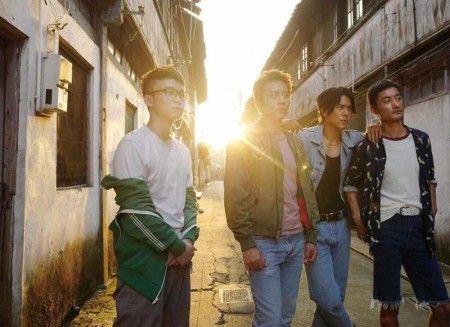
DONG ZIJAN, DENG CHA, EDDIE PENG, AND ZACK GAO IN DUCKWEED
A time travel youth adventure for millennials
Maggie Lee of Variety says the most notable thing about Duckweed, by China's "superstar writer-blogger" Han Han, is "its absolute predictability." Lest that seem a bummer, let us say that it's quite fun and probably not so predictable for non-China film specialists. It's about millennials, and their attitude toward the past, which it depicts though a sci-fi story whereby the protagonist goes back to the 1990's.
The time-traveler is a racing rally driver, Tailang (Deng Cha), who's magically transported back in time by crashing into a train in 2022, which sends him to 1998 and leads him to participate in a gang led by Zhengtai (Eddie Peng), his father. I'd say this is another example of Hong Kong filmmakers' current desire to be relevant while still providing silly fun. Little Ma (Mountains May Depart's Dong Zijan) as the foresighted computer nerd, and Lu Yi (race-car driver Zack Gao) as the lean and mean, thick-headed one make up the rest of "the Zhengtai gang." Tailang has hated his abusive and unsupportive father but now finds the younger version not so bad in many ways. He is most excited to meet his mother, who died shortly after his birth, and that's tricky because at first he doesn't know who she is.
Thanks to Tailang's joining up with his future father, he eventually gets to officiate at his parents' wedding, when he talks about how significant this is to him. "Why does he make everything about himself?" asks his future mother. "That's just who he is," says his future dad, who's become a best friend. Tailang's emotional speech is full of double meanings, but he doesn't expect to be able to change the course of future events. He entertains by singing nicely; Zhengtai amuses everyone as the happy groom by being completely out of tune. When one of the gang members dies through an act of aggression, he gets a farewell montage.
And so it goes. The adventures, and regular attempts at kidnapping by and of a rival gang, and schemes to guess the future which Tailang already knows (that cornering the market on beepers isn't a good idea; that video halls will be trumped by regular movie theaters, and so on), are all basically ways to celebrate the comradeship of an undemanding group of twenty-somethings with a sense of nostalgia. This really isn't as good as Hou Hsiau-hsien's Edward Young's memories of Taipei youth, of Linklater's, or Arnaud Desplechin's "Golden Days," but it will do for a mainstream young Chinese audience, and Eddie Peng (with his middle-parted Matt Dillon look) and Liying Zhao, with her provocative innocence, the future mother Tailang almost gets too close to, are irresistible and engaging. A final big fight with their superior gangster rivals is handled with a light touch. There are nice urban village-scapes making use, Maggie Lee tells us, of Changshou, a thousand-year-old city in the southeast province of Zhejiang with canals and arched bridges. Mandolin music make proceedings sound like a 1960's Italian comedy, but Lee things this flashback is millennials' "jaded amusement," but I'd say it's nostalgia for what they never had.
DuckweedChinese: 乘风破浪 (Cheng feng po lang, "Ride the Winds, Break the Waves"), 104 mins., released late Jan. 2017 in China; Feg. and Mar. in Australia, US, and Hong Kong. Reviewed as part of the July 2017 NYAFF, where it shows 15 July at 12:30 pm at Walter Reade Theater, in Lincoln Center.
Last edited by Chris Knipp; 07-11-2017 at 06:54 PM.
-
SOUL ON A STRING (Zhang Yang 2016)
ZHANG YANG: SOUL ON A STRING (2016)
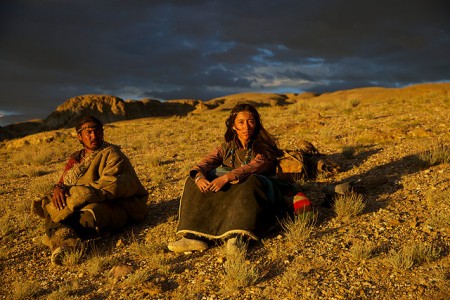
Quest of a home for a sacred object - across desert wilds
In this Tibetan tale from a Chinese director, Zhang Yang, whose previous work has tended toward the quirky and the comic, Taibei, a desert wanderer, kills a deer and finds a sacred stone in its mouth, which sets him on the mission to bring the divine artifact back to its rightful home, the holy mountain of Buddha. This movie, which has authentic costumes, ruddy-cheeked locals, and epic scenery, doesn't know what it wants to be - but so it goes with Tibetan spiritual quest spaghetti Westerns. Sometimes it's antique; sometimes it's contemporary. Sometimes it's solemn and epic; often it's comic. The cinematography by dp Guo Daming is beautiful.
There are black market traders and two brothers in search of vengeance but Taibei gathers camp followers, a colorful singing girl he spend the night with and a mute boy with a stringed instrument that she finds when she goes to get a pot she dropped down a ravine. Sometimes we could be in the American West. Sometimes we could be in the land of sacred myth, the world chronicled by Joseph Campbell. This is a pilgrimage, a sacred journey, by a man who has a treasure to present in a holy land. Stay tuned for the Palm Print Land of the Lotus Master. That's where we want to go. This never grabs you like Sergio Leone or the Jim Jarmusch of Dead Man, but it has its moments.
Soul on a String / 皮绳上的魂 (Pí shéng shàng de hún, "The soul of a leather rope"), 142 mins., from China, in Tibetan, with English subtitles, debuted at Shanghai 2016 in competition, winning the Best Cinematography prize. Some big international festivals, including Toronto, Busan, Hong Kong, Chicago, Golden Horse, Bosphorus and Trento. Reviewed here as part of the NYAFF where it was shown 9 July at the Walter Raede Theater.
Last edited by Chris Knipp; 07-12-2017 at 10:45 AM.
-
SPLIT (Choi Kook-hee 2016)
CHOI KOOK-HEE: SPLIT (2016)
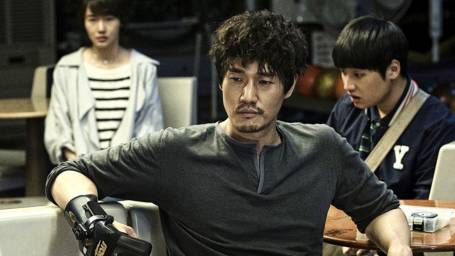
LEE JUNG-HYUN, YU JEE-TAE, AND DAVID LEE IN SPLIT
Bowling, and bonding within the spectrum
This movie, the generally strong (and great-looking) directorial feature debut of Choi Kook-hee, is an odd item indeed. It's a Korean sports drama focused on bowling whose main focus is a young autistic man - and his found mentor, the once-glamorous, now semi-washed up star who bonds with him. There's a pretty woman who needs help saving her property, and there are bad guys and vicious rivalries, and a final victory. What's not to like?
The washed up dude, formerly nicknamed "perfect man" member of the national bowling team, downed by a leg injury, is Cheol-jeong (Yu Ji-tae of Attack the Gas Station and Oldboy). He is hanging out with Hee-jin (Lee Jung-hyun), who's likely to lose her father's bowling alley due to heavy debuts, when they discover an oddball bowler in the alley who only makes strikes. He's the diminutive Young-hoon (David Lee), and he could earn them a lot of money and live a dream in his favorite sport, if they can get through to him.
It takes a while for the macho Cheol-jeong, who's been reduced to being a small-time hustler, makes the adjustments necessary to tame Young-hoon and gain his confidence, though it turns out he has Young-hoon's confidence almost from the first, for a reason that will emerge later. Soon he and Hee-jin figure out why Young-hood thinks he has to bowl only in lane 10, and get around his other peculiarities. The real focus is on Cheol-jeong's gradual bonding with Young-hoon, and the heartening story of Young-hoon's improved relationship with the real world - and his turning into a champion bowler.
Split has been called a "mash-up of White Men Can’t Jump, Rain Man, and Kingpin," and The Hustler has been alluded to. Unfortunately the latter part of the movie is a mash-up of what it is plus a kidnapping and gangster story, which adds a bad taste minutes before the feel-good finale. But the tall former model (and inexplicably never quite A-list)Yu Ji-tae provides a brooding glamor to his role as the former star athlete discovering his humanity, and David Lee does an impressive job of reproducing the mannerisms of autism. And really, dp Baek Yoon-suk's images are a delight to the eye.
Split / 스플릿 (Seupeulrit), 123 mins., debuted South Korea 9 Nov. 2016. Covered by Elizabeth Kerr for Hollywood Reporter at Filmart, Hong Kong. Reviewed as part of the 2017 NYAFF, where it was shown in early July 2017.
Last edited by Chris Knipp; 07-13-2017 at 08:18 PM.
-
GODSPEED (Chung Mong-hong 2016)
CHUNG MONG-HONG: GODSPEED (2016)
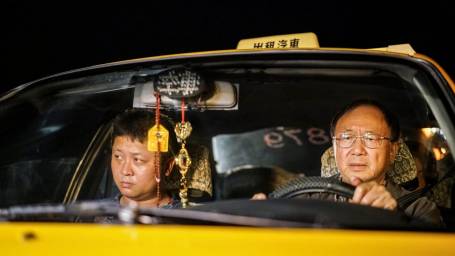
NA DOW AND MICHAEL HUI IN GODSPEED
A Taiwanese riff on the edge of noir
A young Taiwanese drug mule (Na Dow) has his foolproof smuggling method thrown out of whack when he catches a ride with the wrong cab driver, in this caper starring veteran Hong Kong comic Michael Hui, here playing a long time Taiwan resident and cabbie who insists on taking him even though he's already been driving all night.
As an Edinburgh Festival viewer of this film said, "Godspeed walks a weird line between violent gangster bloodshed and buddy comedy that doesn’t always work." It's a strange hybrid for which the word "Tarantinoesque" is a shade too generous. But there are eccentric, highly specific incidents. A Thai gangster is taunted by his Chinese associate for keeping his long sofa covered in its original protective plastic coating for ten years. So they take it of, and the owner proudly chortles over how like new it is. The cabbie stops to get food, and it turns out the line isn't for a restaurant but a gangster funeral. They are forced to go in and pay a donation.
The drug mule is notable for his laziness. He got the job merely by answering an ad. And instead of arranging a carefully planned, secure form of transportation, he just takes cabs back and forth to carry the drugs the whole way from one end of the country to another.
In festivals this film has been billed as a "dark comedy," but it is more accurate to call it "a crime drama with moments of levity." Uglier scenes featuring crime bosses that alternate with the road trip carry the greater sense of action: the trip itself verges on a Beckettian futility, alternating with serious mishaps. This is good material for the actors, potentially, at least - but the filmmaker has not quite got his mix of genres in good balance. Nice ending, though, turning this into the kind of lived-in buddy picture this has always aspired to; and the tech aspects are fine. Delicate use of mandolin music adds a pleasantly sentimental note to a very unsentimental, deadpan movie.
Godspeed / 路順風 (Yi lu shun feng), 111 mins. debuted at Toronto Sept. 2016, also at Vancouver, Tokyo, Taipei, Buenos Aires, Seattle, Edinburgh, Bucheon. Reviewed here for NYAFF, showing 1 pm July 16 at the Walter Reade Theater.
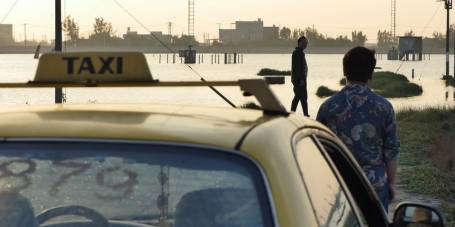
Last edited by Chris Knipp; 07-14-2017 at 01:12 PM.
 Posting Permissions
Posting Permissions
- You may not post new threads
- You may not post replies
- You may not post attachments
- You may not edit your posts
-
Forum Rules





 Reply With Quote
Reply With Quote







Bookmarks